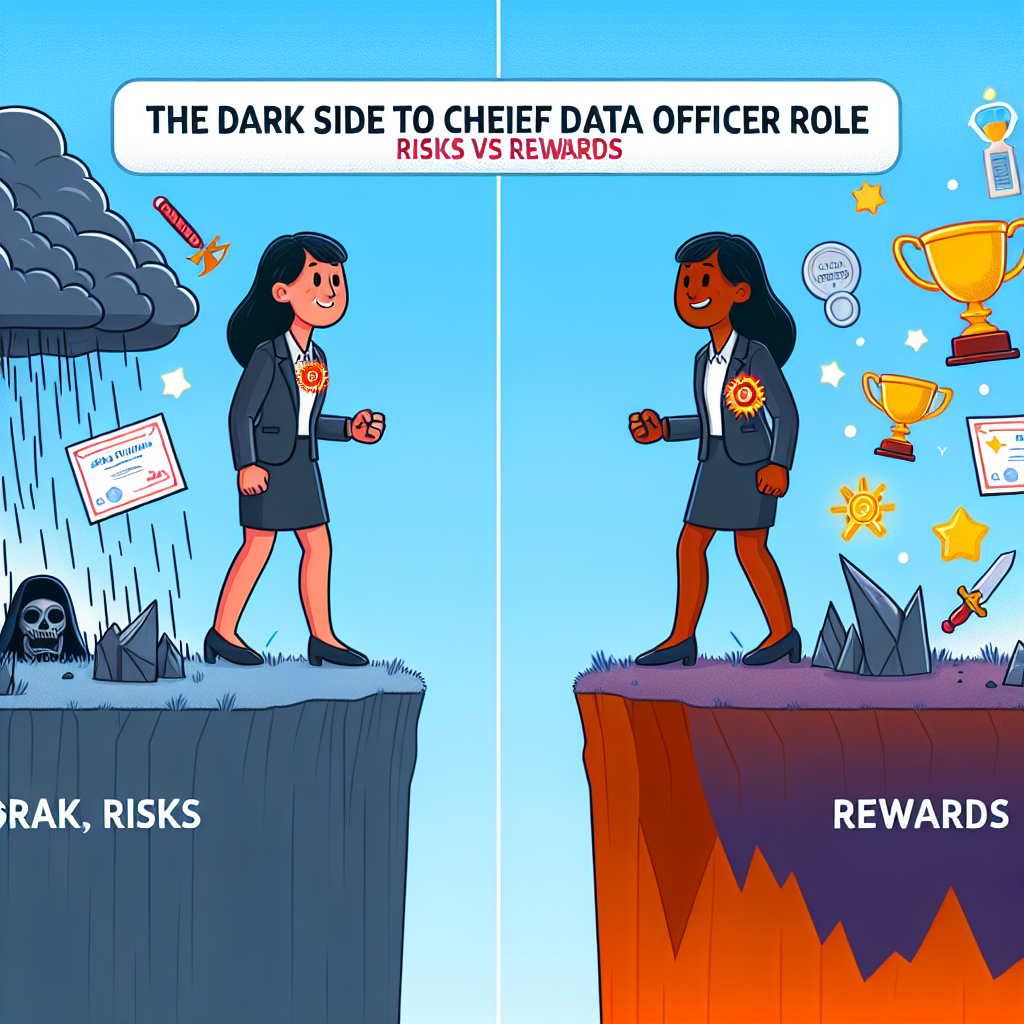The rise of big data and analytics has seen the Chief Data Officer (CDO) become one of the most crucial roles within modern enterprises. Organizations, now more than ever, are recognizing the value of data as a strategic asset that can drive innovation, customer satisfaction, and competitive advantage. However, as with any position that comes with great responsibility, there are inherent risks that accompany the potential rewards. The role of the CDO is nuanced and complex, and understanding the dark side is essential for those in the position or aspiring to it. Below, we delve into various facets of the CDO role, discussing the potential pitfalls and how they stack up against the benefits.
Risks Associated with the Chief Data Officer Role
The Chief Data Officer role carries with it a number of potential risks, from operational pressures to strategic alignments. The dark side of the CDO role can manifest in various ways:
Data Governance and Security
One of the primary responsibilities of a CDO is data governance and ensuring the security of data. With the rise in cyber attacks and data breaches, a CDO can find themselves at the center of a maelstrom if data under their purview is compromised. They must navigate the complex world of data privacy laws, such as GDPR and CCPA, and failure to do so can lead to significant legal and financial repercussions for the business.
Change Management
Implementing a data-driven culture often requires substantial change management, which can be a considerable challenge. Not all organizations are ready to embrace the changes necessary to leverage data effectively, and resistance from various levels within the company can stymie progress and derail initiatives, potentially reflecting poorly on the CDO.
Technical and Business Alignment
CDOs must possess a unique blend of technical knowledge and business acumen. Striking the right balance is crucial, as focusing too much on one versus the other can lead to a disconnect with business objectives or technological capabilities, jeopardizing the value of data projects.
Data Quality and Integration
Achieving high-quality, integrated data across different systems and platforms can be an arduous task. The CDO is responsible for ensuring data accuracy and usability, which often involves cleaning up legacy systems and data warehouses—a process that can be fraught with unforeseen difficulties and delays.
Short-Term Role Viability
The CDO role, in some cases, can be viewed as a short-term position focused on getting the organization’s data house in order. If the role is not seen as a long-term strategic position, CDOs might find their influence and job security waning once immediate data issues are addressed.
Rewards of Being a Chief Data Officer
Despite the challenges, the role of a Chief Data Officer offers rewarding opportunities that can far outweigh the risks:
Influence on Business Strategy
A CDO has a significant opportunity to influence the direction and strategy of a company through data-driven insights. This can lead to groundbreaking initiatives that can propel a company forward and position the CDO as a key strategic leader within the organization.
Driving Innovation
With access to an organization’s data assets, CDOs are at the forefront of driving innovation. They have the ability to identify new business opportunities, optimize operations, and create unique customer experiences, all by leveraging data insights.
Visibility and Recognition
Successful data initiatives can significantly boost a company’s performance, often resulting in high visibility and recognition for the CDO. This can translate into a solid reputation and considerable career advancement opportunities.
Market Demand
As companies become increasingly data-centric, the demand for experienced CDOs continues to rise. This not only enhances job security but also allows for increased negotiation power regarding salary and benefits.
Formulating Data Culture
CDOs play a central role in cultivating a culture that values data as a key asset. By fostering an environment where data is integral to decision-making, they can lead a paradigm shift that positions the organization for long-term success.
Striking a Balance Between Risks and Rewards
Finding the balance between the risks and rewards of the Chief Data Officer role rests on a number of strategies and best practices:
- Implementing a robust data governance framework can mitigate risks associated with data breaches and compliance issues.
- Strong leadership and clear communication are essential for effective change management and for promoting a data-driven culture.
- Maintaining a balance between technical expertise and business strategy ensures that data solutions are both practical and aligned with organizational goals.
- Building a dedicated team can help manage the complexities of data quality and integration challenges.
- Continuous professional development and networking can help CDOs stay at the forefront of data trends, enhancing their long-term role viability.
The role of the Chief Data Officer is fraught with challenges, ranging from technical difficulties to organizational change resistance. Despite these challenges, the opportunity to drive strategic value through data is immense. By effectively managing the dark side of the CDO role—focusing on governance, change management, and the delicate balance between technical and business knowledge—these leaders can harness the power of data to drive significant organizational rewards. The risks are real, but for those who navigate them successfully, the role of Chief Data Officer can be one of the most influential and satisfying positions in the modern business landscape.
At the heart of the CDO’s journey is the quest to turn data into a strategic asset while ensuring it’s used ethically and legally. Thus, in the interplay between the risks and rewards, the success of a CDO often hinges on their ability to anticipate challenges, adapt to ever-changing data landscapes, and continually advocate for the strategic importance of data in driving business success.
